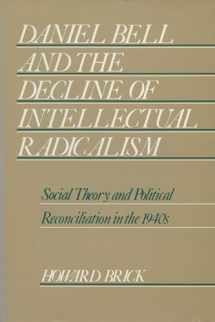
Daniel Bell and the Decline of Intellectual Radicalism: Social Theory and Political Reconciliation in the 1940s (History of American Thought and Culture)
Book details
Summary
Description
What causes a generation of intellectuals to switch its political allegiances—in particular, to move from the opposition to the mainstream? In U.S. history, it is the experience of the “Old Left” intellectuals, who swung from avowal of socialism or Communism in the 1930s to apology for American liberalism in the 1950s, that raises this question pointedly. In this highly original and broadsweeping study, Howard Brick focuses on the career of Daniel Bell as an illustrative case of political transformation, combining intellectual history, biography, and the history of sociology to explain Bell’s emerging thought in terms of the tensions between socialists and sociological theory. The resulting work will be of compelling interest to Marxists and American intellectual historians, to sociologists, and to all students of twentieth-century American thought and culture.
Daniel Bell’s route to political reconciliation was a tortuous one. While it is common wisdom to cite World War II as the force that welded national unity and brought Depression-era radicals to an appreciation of democratic institutions, the war actually turned the young Bell to the left. Opposing the centralized power of American business and military elites at war’s end, Bell shared the “new radicalism” that infused Dwight MacDonald’s Politics Magazine and motivated C. Wright Mills’ early work. Nonetheless, by the early 1950s, Bell had declared the demise of American socialism and endorsed the welfare reforms of the Fair Deal. Brick’s study finds, however, that the “new radicalism” of the mid-1940s helped to shape Bell’s mature perspective, giving it a richness and critical edge often unrecognized. Brick finds that the heritage of modernism, as manifested in social theory, knit together the process of political transformation, combining disdain for the false promises of liberal progress, estrangement from society at large, and reconciliation with a reality perceived to be full of unconquerable tensions.
Brick locates the foundations of Bell’s mature social theory in the historical context of his early work—particularly in the political concessions made by the social-democratic movement, in the face of the Cold War, to the reconstruction of capitalist order in the West. The crucial turning point, in World politics as in Bell’s thinking, can be located in the years 1947–49. After that point, the different strands of Bell’s thinking came together to represent the contradictions in the perspective of a social democrat trapped by the “iron cage” of capitalism, who saw in his political accommodation both the road to progress and the rupture of his hopes. This peculiar paradigm, shaped by the experiences of deradicalization, lies at the heart of Daniel Bell’s social theory, Brick finds.
At the present critical point in American history, as a new generation of leftist intellectuals undergoes a process similar to that of Bell’s generation, Brick’s work will be especially important in understanding the historical phenomenon of deradicalization.


We would LOVE it if you could help us and other readers by reviewing the book
Book review



